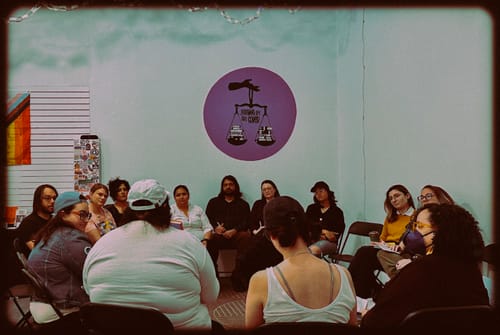By popular demand, uSpark and Judging by the Cover Bookstore partnered to bring a social justice book club to our patrons. The collaboration is also part of a local resistance movement to create sustainable change through community building, education, and direct action.
The book club's purpose is to hold space for meaningful discussions about challenges that affect our community members which are interwoven with larger systemic issues.
2025 Radical Reads
On March 29th, folx met at JBTC to vote (using a ranked choice system) for this years selection of radical reads, a total of 5 books for the remainder of the year.
Attendees brought a text to share with the group and had the opportunity to pitch why they thought it would be a good pick for the book club. While many folx had initially voted based on the written descriptions of each text, after many informational and passionate speeches, many changed their minds.
And the first five reads will be (drum roll please!):
- There Is a Rio Grande In Heaven
- Practicing New Worlds
- Pedagogy of the Oppressed
- Caliban and the Witch
- The Dispossessed
You can check out the full list of books recommended at the meeting here: R.A.D. Book Club Reading List
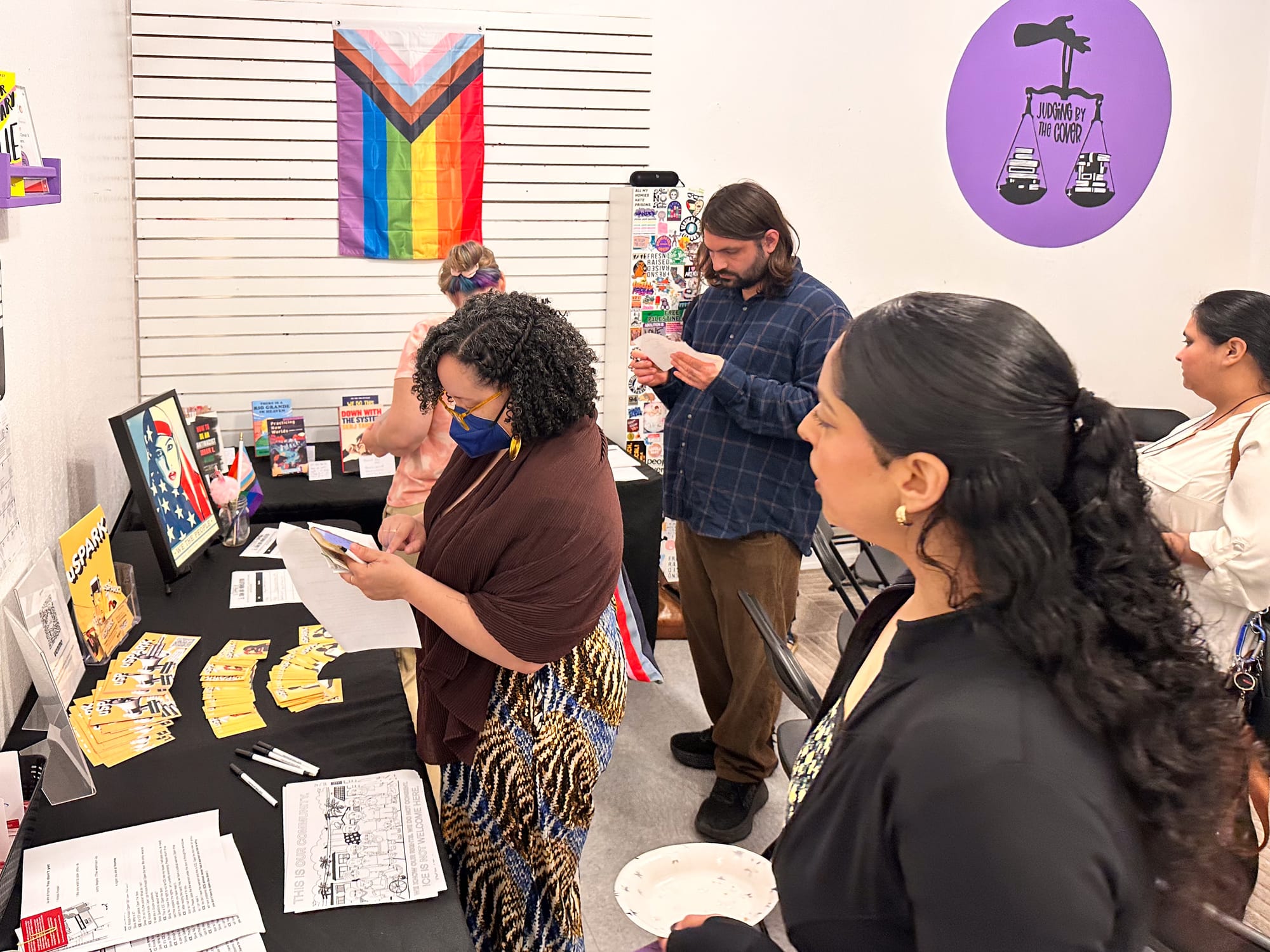
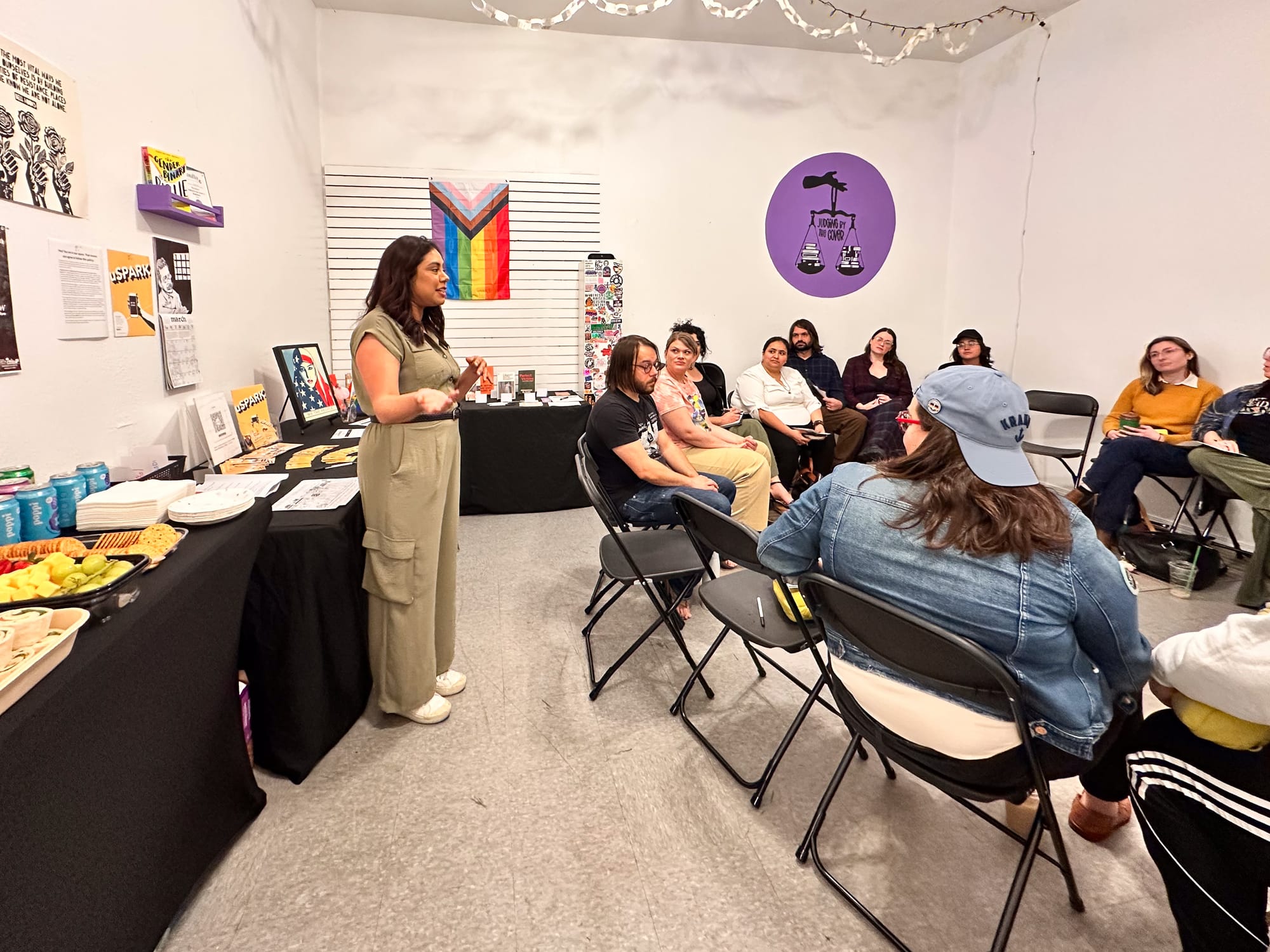
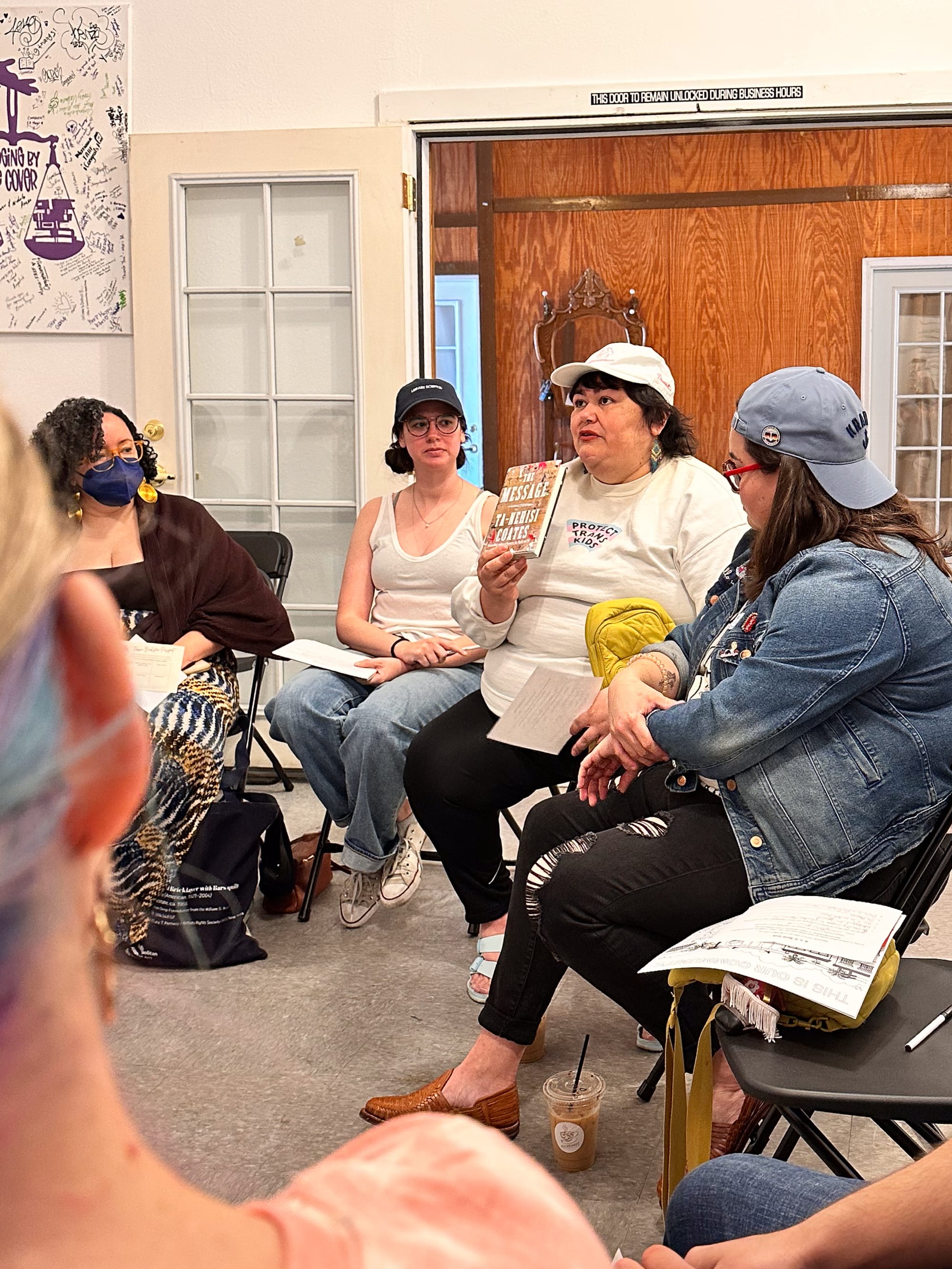
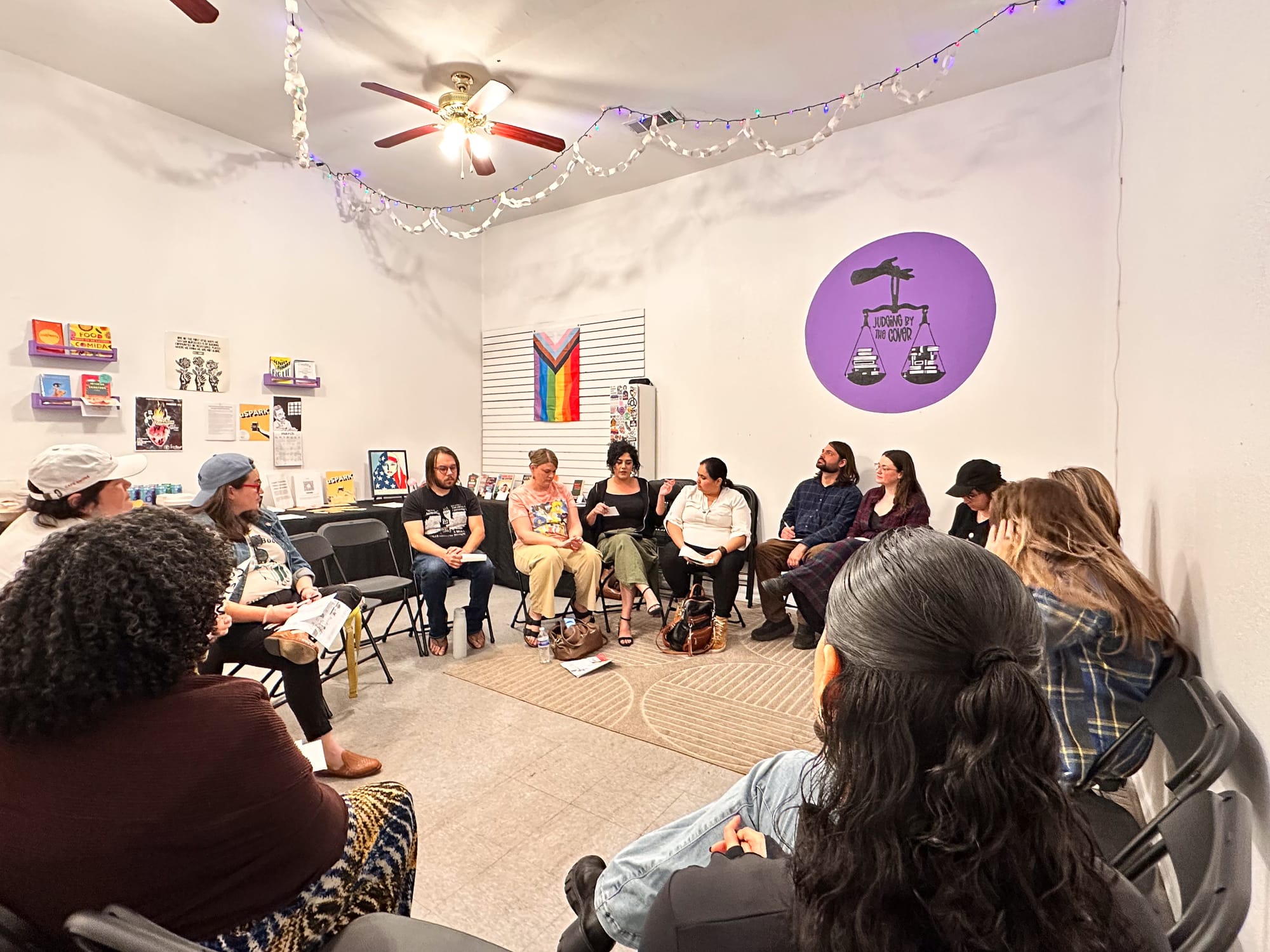
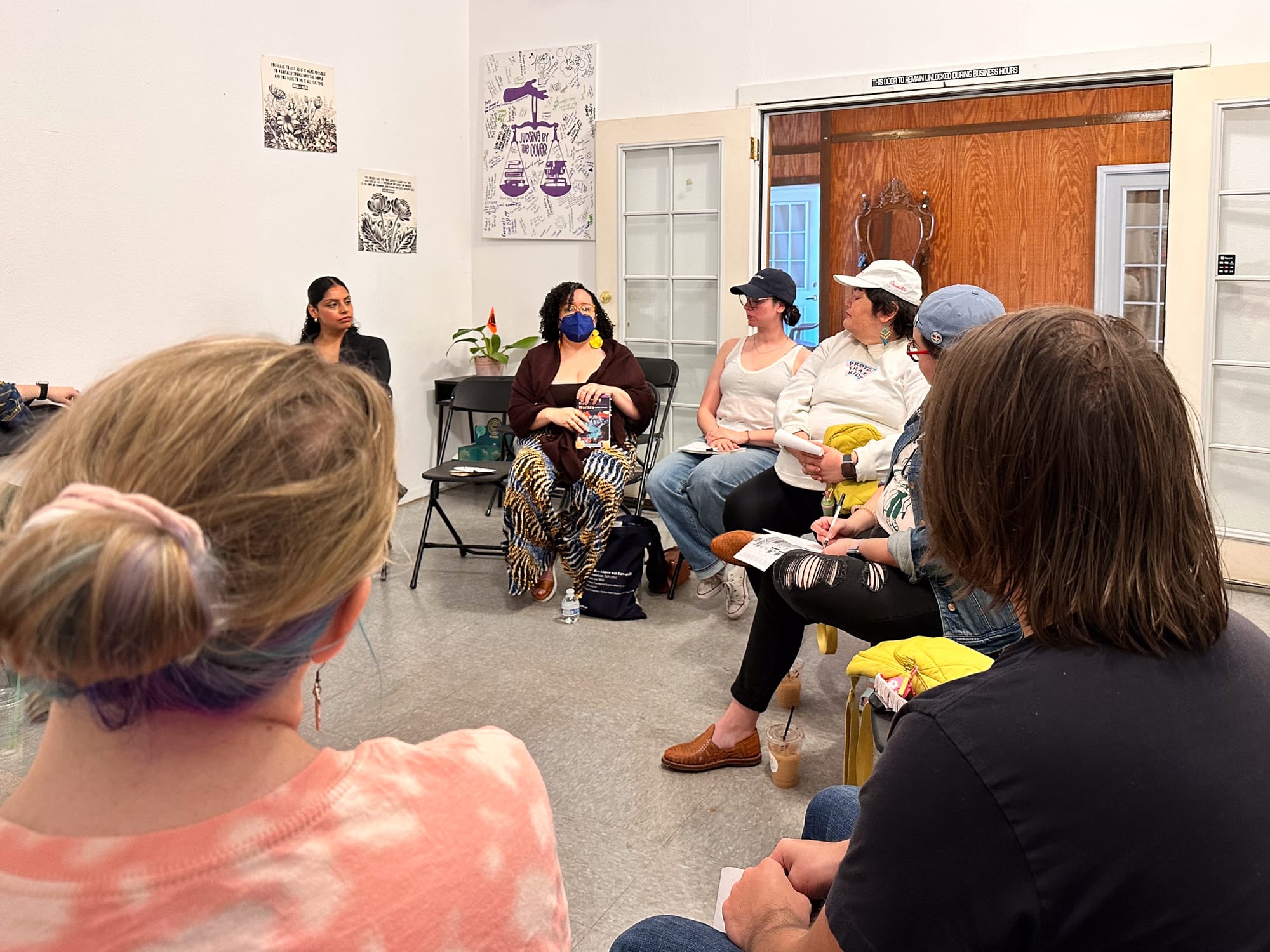


Attendees held a rich discussion ranging from serious to joyful.
Never Too Late to Join
Here is a bit more information if you are interested in joining
"Meeting Structure:
We’ll plan to meet twice for each book—once for a mid-read check-in and again for a full discussion at the end—giving everyone about two months per book. During the mid-point meeting, we’ll check in to see if we’d like to extend the reading timeline or adjust as needed.
Meeting Schedule:
We’re proposing to meet on the last Saturday of each month. If that works for everyone, we’ll stick with it moving forward and have our next meeting on April 26th.
Stay Connected Between Meetings:
Join our Meetup group to stay updated on upcoming events, share thoughts, and keep the conversation going:
Invite a Friend!
Our club is open and welcoming—feel free to share the Meetup link with anyone you think would enjoy joining us."
Q&A with the Hosts
On Wednesday, April 24th, I sat down with Ashley of JBTC to talk about the relevancy of a social justice book club in Fresno (along with some inbetween yapping). We discussed the importance of creating dedicated spaces for learning about social justice issues, the role of literature in challenging assumptions and expanding perspectives, and the potential impact and barriers to participation in such a book club.
You can read the full transcript below:
Mars: I think I can just go like that because very distracting. Yeah. Okay. I'm scared. Okay. All right. I don't know why I'm talking like if anyone's even going to hear this, no one's going to.
Ashley:“So today on the pod”
Mars:Put my radio voice on “today on the pod”... so yeah. Why did you want to create a social justice book club?
Ashley: Trying to get more people to read and think critically about social justice issues is kind of the main focus of our entire business to begin with, so it made sense for us to go this route. When we very first opened, there were a couple of book clubs who were dedicated to reading books about social justice issues and nonfiction, and so we held off on it, but those have kind of gone away and disappeared, and so when uSpark, you guys came to us and said, we'd be willing to partner on this. It was just the perfect timing to finally launch it because it's always kind of been in the back of our heads.
Mars: Yeah, no, it is funny because a few people have asked us at uSpark to start a book club and it just kind of, it made sense… and then the timing, it just kind of came up and I'm glad it was good timing for you too.
Ashley: Yeah, I think it really all worked out. I have a list of things that I want the store to do at some point and that has been on since even before we had a physical location. And I think we're also in a time when people are more likely to want to be reading a little bit more critically just because of the state of the world. The conversations are going to be a little bit different had we launched it a year ago.
Mars: Right. Yeah. I definitely see that in a lot of areas, these uprisings happening and people are more motivated because the disarray is more visual or visible.
Ashley: It’s very upfront and center, and so people want to learn, oh, what do I do? But they don't necessarily, not everyone wants to read very heavy theory, and so I think having a book club where we're reading some fiction, some memoir and things that are a little more accessible than a white page about what's going on, it's like the perfect blend of what people are looking for, and then they also want community. You can read these books by yourself and learn a little bit, but being able to talk to someone else about it and get different perspectives and also have a group of folks who are like-minded or interested in the same topics is helpful too to just kind of get it out there in a group setting.
Mars: And from an educational perspective, just talking about it can reinforce the learning and solidify it, and then you get context from different people.
Ashley: Yeah. Even our first meeting to pick the books, I think it was helpful to hear why different people liked different books or why different people were interested in different books because when we got back the list of rankings, some people changed their rankings after...
Mars: I saw that!
Ashley: …hearing other people talk. And so I think that's also important- you shift your perspectives a little bit. Maybe you do know about immigration, but you don't know specifically about the history of El Salvador and their immigrating to the US and why, or maybe you have a general understanding of first wave feminism, but you don't understand womanism and all these other, I don't even know if they're all called waves, but all these different forms that kind of exist out there and how they intersect in other ways, and so it lets you have a conversation and build on your understanding too.
Mars: Yeah, absolutely. Okay. Let's see. Why is it important to create dedicated spaces for learning about social justice? I feel like we kind of talked about that a little bit, but if you wanted to add anything.
Ashley: I think setting the time aside is kind of important. You can literally learn everywhere now. People are online saying Google is free. You could literally Google and learn about anything at any time. You could scroll through TikTok and find a ton of information, and so having a time where you're like, okay, I am going to this place. I'm going to talk to these people. I'm reading this book, and we're going to think critically. That format kind of forces a different type of understanding than endlessly doom scrolling to learn about what's going on. I think it's better for some folks just from a, what is that called? Your, what is the word that I'm thinking of? My brain is- your nervous system to not be just endlessly on the internet looking things up, but it also lets you pace yourself, so we're not asking you to read a whole book in a month. We're giving you some time to really take it in and sit with it a little bit, which I don't think a lot of people do anymore. Even with books, there's this trend that people are reading 500 books a year, so they're not really sitting with the content, and I think Book Club makes you sit with it a little bit.
Mars: That part about setting aside the time resonates with me and this information overload that we have, it's too much for me, and I'm sure a lot of people experience that too, so having that time set aside, that's how I feel about the news. I'm trying to find a magazine or The Week magazine, I don't know if you've heard of that, but it basically takes all the most important things, and so I can set aside time at the end of the week to, because it's a balance of trying to be aware, but also not constantly being overwhelmed.
Ashley: You could get breaking news every single second of every single day, and at that point it's just too much information. Things are not fully understood yet, and it can become very taxing on your nervous system.
Mars: The flooding the zone thing. They're doing that on purpose. Yeah, it's a lot. They know what they're doing.
Ashley: It is definitely a lot.
Mars: Yeah. Okay. How can a book club focus on social justice help us better understand systemic issues in our community?
Ashley: I think for our community specifically, there are some really big issues that get a lot of press. There are some groups who are doing a really good job of letting the community know what's going on, and then there are other communities within the Central Valley that don't get that same shining light or big neon sign, and so when we're doing book club in kind of a smaller space with a bunch of different individuals from the valley, we're hearing different perspectives that we might not have had we just gone with our normal group of people or gone to the big event that you don't really have a lot of one-on-one time and just literally being able to talk to your neighbors is a huge thing, and it is also a form of community building that I think gets lost a lot of times,
Mars: Especially when it's a circle and we get to look at each other's faces
Ashley: Yeah… I think because I think some people do, there's conversations online, there's conversations had in bigger spaces, but a lot of times it's affinity groups. It's all queer folks or it's all Sikh individuals, it's all Latinos, and because this is broadly social justice, there are people from all those different organizations kind of coming together and talking about a ton of different topics, and not all of our books are nonfiction, so when you're talking about fictional narratives, you're also going to get people's lived perspectives in their interpretation of it, which makes for even deeper community conversation.
Mars: Yeah, absolutely. Actually, that reminds me, that's our next question. What role can literature, specifically fiction, play in challenging our assumptions or expanding our perspectives? I think my thoughts about this question is that a lot of times people think they need nonfiction to learn about specific topics, but yeah, what are your thoughts?
Ashley: I think big, it depends because you can read all of the bestsellers, all of the beach reads and not get a whole lot from 'em. They're very fluffy, easy reads, but when you're very intentional about reading from diverse perspectives or folks who are writing from their lived experience, then you're starting to understand something that you would have never been able to see otherwise because not living that. I always think about, I have Native American heritage, but I've never lived on reservation. I've always lived in cities, and so when I read those stories, it gives me a whole other understanding of my cousins and my heritage and where folks from the same background as me are currently, because that's a perspective that I've never experienced, even though it is still part of my lineage.
You can also read things that are completely different. I've learned so much about Desi culture from these romance books that are set in India, and so people will be talking about, oh, I'm going to a wedding and this and this, and I'm like, oh, yeah, I read about this before. It was a big thing a while back where people were saying, I'm going to wear this to an Indian wedding, and people were like, oh, no, no, no. You should be wearing way more bling. Dress it up. This is way too underdressed, but because I've been reading these Indian romances, I already knew, oh, you have the context. You definitely need to dress up. This is a fashion show.
Mars: Wow. Now I need to know what books those are.
Ashley: Yeah, I have a couple of 'em I think still. I was trying to see if I do, but I can't read this far. Yeah.
Mars: When you say romance, do you mean smut? Is that the same thing?
Ashley: These are not very smutty. They are traditional romance tropes. The first book in the series, she's poor and he's rich and they fall in love. The second one is Secret Millionaire where she meets him and thinks like, oh, he works for the hotel too, and then finds out that he's the owner.
Mars: That's hilarious. Maid in Manhattan.
Ashley: Yes. Literally. That's like a romance trope… It doesn't have to be even a really deep novel. There are some really great literary novels that dive into what it's like to be trans or to live in poverty, but it could also be a romance book that's written by someone from a different culture and you're learning about their traditions that way or their foods that way. There's one that, it's a romance that is set in a boba shop, and so she's a first gen Korean who is trying to make her parents' business thrive, and a lot of what they're talking about is their food in that book, and so the whole story is a romance, but you get a lot of information about their food and their culture and how they talk to their elders, and so just reading from those true perspectives where they're not using stereotypes, they're actually talking about it, you can learn a lot about different cultures.
Mars: Yeah, I love that. I used to work at the Arne Nixon Center, and I got to focus on the LGBT collection there, and that was something when LGBT literature was first coming out it was all about the issues...
Ashley: Trauma.
Mars: ...and, right. There was no... the stories, they were centered on that and now they're being centered on things that are everyday lived experiences, now you get to see the joys and I think that's really important.
Ashley: And as long as it's genuine, as long as it's own voices and it really is own voices, you'll learn a lot just through the storytelling, but definitely watch out for, there are some books that-
Mars: Yes, a couple come to mind.
Ashley: Yeah, they're not really written by the people, but they try to set it in Mexico or one that has been coming up a lot is there are Middle Eastern books that are not written by people from a Middle Eastern background, and so it becomes very, like you said, trauma dumpy where this is a war torn country and everything is terrible because that's how they see it from an American lens, and that's a problem. Definitely make sure that it's written by someone from that background.
Mars: Yeah, I agree. Can you think of, I know you said you weren't good about talking about specific books, but maybe there's one book that you can talk about that might have shifted your view on social issues?
Ashley: I mean, there's a lot of books that I think I like a lot of the framework that I use to build up the store and what we do here comes from literature, it comes from reading different books. If I had to pick one specifically recently that kind of changed the way that I wanted to operate or do business, it's the anti-racist business book by Trudi LeBron. There's a lot of really good information about creating equitable business, but also one that doesn't necessarily lean into capitalism all the way, which was something that we were trying to figure out, and I understand socialist framework, I've read the theory, but doing it in practice as a retail business is not easy, and so someone recommended that to me and I was like, okay, I think I get it. As far as nonfiction, I would say, I don't know…
Mars: Can you think back to one of the first ones maybe? Was there any one book that kind of was just like, whoah?
Ashley: I think if I go all the way back, it's like Esperanza Rising comes to mind. It was one of the first books that we read that wasn't set in the past or England or they're not in the forest. It's real life, so I think that one. Also a lot of Sandra Cisneros work kinda shifted my perspective of what was literature and how books can teach you about humanity or I guess cultures, but I don't know. This is hard.
Mars: I mean, I think that you explained it pretty well.
Ashley: I think also I read a lot of memoir and that definitely helps. I love reading history and I love reading theory and then reading a memoir from somebody who is active in the movement. That's always a big, this is what was really going on. There's this book actually that I recently read. It's a book of letters called If They Come For Me at Night, and it's a bunch of letters of 1960s social justice advocates when they were imprisoned writing back and forth to each other, and that is kind of, you think of some of these people like Angela Davis was never scared, completely fearless, and then you see the letters that they're writing back and forth to each other where they're kind of like, well, this is happening. It's fine. We're going to get through it. It doesn't have to be me that is the face of this movement, and then of course she becomes the face of the, but she very much at the time when she was arrested was just like, well, I guess this is it, and it's inspiring in a way because sometimes I'm just like, damn, what are we going to do now? And knowing that even some of the most well-known names in the history of abolition, of the Black Panthers, of literally everything, were also just like, okay, this is it for me, but these are the next steps and just like, let's keep it going even if it's not me.
Mars: Do you have that book?
Ashley: I don't know. I might still have one.
Mars: Okay. I need the title at least.
Ashley: No, it's really good and I love a first person perspective of history and since they're letters… I also really like Oscar Wild's book of letters from when he was in prison because it gives you an idea, you know what happened, but it gives you an idea of where their head was in that moment and sometimes what pushed them to keep going even when it looked like it was all over for 'em.
Mars: That's Interesting.
Ashley: I think that's also kind of where we're at right now. A lot of people are just like, well, we’re screwed, let's just leave the country. And there's some conversation about that. Well, you could go to Cuba or you could go wherever, and she's just like, no, let's keep it moving. Let's see what we can do.
Mars: Yeah, that is inspiring, especially because we put people on a pedestal that we, I mean in my opinion, they should be because they did so much good, but we forget that they are-
Ashley: Yeah, they're human. There's a book of people recounting and I cannot remember what it's called, but it's them remembering working with Toni Morrison and how she wasn't, she always knew directions that she wanted books to go editorially, but she wasn't always as confident as all her quotes and speeches here. I always think that's very interesting because you think of her as this. She knew exactly what she was doing. She was the best editor ever, and there's people who are like, yeah, sometimes she would be like, well, I don't know, let's sleep on it, kind of thing. I dunno.
Mars: It's all so interesting. It definitely gives motivation to just keep going, right? Just, yeah, to think about people like that who did so much, but they experienced the same kind of-
Ashley: Imposter syndrome almost. Yeah. They weren't calling it back then, but even all of your heroes felt it.
Mars: Right… Okay, cool. Let's see. What kind of impact do you want this book club to have? Personally, locally, or even more broadly, so we kind of also hit on that, but I guess we hit on how they can, but how do you specifically want them to?
Ashley: I do hope that people make friends. I hope that people spread the word and tell other folks about it. I hope people enjoy themselves mostly. That's the goal. I want it to be a learning experience, but also something where it's not a task where it doesn't feel like they have to read half the book and show up here and ‘Oh my God, I have to talk about this’. I hope that it's a fun experience. I know that it's going to be hard. Some of the topics that we're going to cover are, they're not, they're tough topics to talk about and they're going to be a little bit heavy, but I hope that everyone who comes really enjoys having the space. I know I have heard people talk about book clubs and be like, they picked this book and I hate it, and I have to read it, and I hope that that's not the case here.
Mars: Yeah. I think because we're all talking about a specific topic we're all interested in and then layering that with lived experiences with community members and yeah, I don't know, I think it'll be good. In what ways can we go beyond reading into action or community involvement?
Ashley: I mean, I guess it depends. I think with a lot of folks who read, especially theory for the first time, they want to do something, they want to start a protest or start an organization. I think that's great. If you're inspired to get involved because you read something, definitely do it, but also don't feel the need to reinvent the wheel. There's a lot of orgs in Fresno, and so if you read something and you feel inspired to action, try to see what is around here, try to see what's going on. We have orgs for people who are interested in environmental issues and Palestine and social justice broadly, and workers' rights. I know both colleges have social justice clubs you can get involved with, so if you're inspired to action, absolutely do it, but also try not to start from scratch because just because you just learned about it doesn't mean the work isn't already happening.
Mars: That resonates. What concerns or hesitations might people have about joining a social justice focused book club or I guess that the book club or more broadly, social justice in any form? Concerns, hesitations, barriers.
Ashley: I think one big barrier to entry for book clubs especially is the cost of books, and so for us in this store, we do have a give a book fund, so if you don't have the means to buy a book, you can come get one book for free per visit, and that could be your book club book. We also give away free audiobook credits, so if you want to listen to a book, you can't read it for some reason, that kind of lowers the barrier to entry here. Right now, we don't have a virtual version of the club, so you do have to show up in person, but we are working on something there to try to figure out how we can make it virtual. Those are really the two main barriers to entry for book club attendance- being able to show up and then being able to buy the book.
For doing activism work, there are a lot of ways you can get involved. I think finding what works for you, whether it's ‘I have one day, one time where I could show up and do something’ or ‘I have an hour a week and I have to do it from home.’
Reaching out to the org, you're interested in letting 'em know what the situation is and seeing what is available is the best way to go about it, because a lot of people, I think, feel like they have to do all the things all the time, and you don't really, you just need to figure out, look at your schedule, look at what you actually have capacity for, and then figure out what you can do. And the same thing goes for book club too. Maybe you can read this book, but you can't read the next one. That's fine. You can come and go. Also, you might want to read this book and hate the next one. You don't have to participate if it doesn't resonate with you, do what is best for your situation in the moment.
Mars: Yeah, a lot of thoughts come to mind when you're talking about that, just like how community... like so ‘how much time do I have?’ We think we need to be the one to do everything, but that goes into this individualistic society that we have - well, not, we, but WE have cultivated that perpetuates that myth.
Ashley: Yeah. Be honest about your capacity too. Can you do book club during the summer, but not during the school year? That's fine. Nobody is making you sign a contract that you have to come and read all the books and participate forever…”
Mars: Which is like the same thing about it being perpetuated that you have to do something exactly a certain way that you've been trained to do things, and even the idea of being realistic about your own capacity. How often are we expected to work beyond our capacity? Go beyond our capacity.
Ashley: Figure out what works for you and do what works for you. The other thing too is if you're trying to be part of a community, if you're trying to be part of an organization and you burn yourself out, you're not doing yourself any favors and then you're also no longer able to help, and so it's better that you be realistic than running yourself into the ground and then just leaving people stranded.
Mars: Yeah. I think it's important to see it in a way that's more, I don't know if creative is the right word, but just to where, I don't know, I can't think of the right word, but for lack of a better saying, think outside the box when it comes to really anything because I don't know personally, I feel like I get tunnel vision about a lot of things and I'm realizing how that's connected to conditioning…
Ashley: And it's also if we want to really dive into it, decolonize the way you think about your schedule, listen to what your body is actually capable of doing instead of sticking to a rigid, I have to do this this month, I have to do this this week. Sometimes some seasons you do need to rest and that's okay. That's the natural cycle of things,
Mars: And that takes a lot of work and it's even inaccessible at this point to some people because of the structure.
Ashley: Yeah. Yeah, so that said, knowing that capitalism exists and you have to work your job, it is okay if you can only participate in book club for one book, and that's what you take out of it. You can read the books independently if you want to continue. Don't feel the pressure to have to show up because it's not going to help anyone.
Mars: Absolutely.
Ashley: Yeah.
You're Invited!
The next meeting is Saturday April 26th at 11:00 AM at Judging by the Cover. Join the conversation (even if you haven't read the book!).

